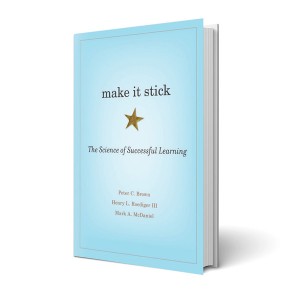As I mentioned in my last post, a lot of the study methods most college students rely on have no scientific basis. In fact, there are even a few quick changes you can make to your study habits that will help you absorb information much more quickly and store it in the long term, so you can ace your cumulative finals with ease and retain that knowledge for when you enter the job market.
Peter C. Brown’s 2014 book Make It Stick exposes these hidden truths about studying, explaining which methods are the keys to success and which are simply the same trite unsubstantiated claims recycled over and over again.
Recently, I had the opportunity to ask Mr. Brown a few questions about his book and its implications for learners and educators and lovers of knowledge alike. Check out my interview with him here:
Q: I love that your book touches on students’ tendencies to be discouraged by failure and thereby categorize themselves as specific “types” of learners despite the absence of scientific evidence to substantiate these labels. What do you think people find so difficult about initial failure? If you had to give a word of encouraging advice to those people, what would you say?
A: “I grew up with 4 older brothers who knew how to do everything that I didn’t. It’s just central to one’s self image to avoid looking stupid at all costs. Nobody explained to me back then that trial and error are essential. What we need are classrooms where trial and error are celebrated. My advice is to find a like-minded friend for mutual support, assume the persona of one who is fearless, and forge ahead. Setbacks are evidence that you are hard at work while the timid people sit back chewing their nails and privately envy your confidence.”
Q: Make It Stick’s references to the learning techniques and high-pressure situations surrounding the experiences of pilot Matt Brown and neurosurgeon Mike Ebersold illustrate the importance of making information personal in order to recall it effectively. Do you have any tips for the average person trying to make schoolwork more personal or more relevant to his or her own life?
A: “You have to pause and ask how is this like something I already know? Can I think of a parallel in my own life? Why not say to the teacher, “I think I would understand and remember this better if I could think how it is useful to me, or how it connects to what I already know. Can you help?” This would make for a good class discussion.”
Q: Are you surprised that so many institutions (like George Mason University and Dartmouth College) offer study advice that is just blatantly incorrect? What do you think is the reason for this?
A: “I have not checked their websites since writing Make it Stick; perhaps they have revised their advice. Educators do not have a tradition of basing instruction on empirical evidence, largely because there has not been a body of such evidence until recently. But science has made huge strides, and we know from feedback to our book and others’ that many schools, notably through their centers for teaching and learning excellence, are aligning their advice and resources with the empirical evidence.”
Q: Make It Stick cites an example of a Washington University professor’s success with an unconventional frequent quizzing system in the place of larger exams, and also offers a section devoted to tips for teachers. What are your aspirations for the book? Ideally, how widespread would the impacts of these suggestions be for our education system?
A: “I would hope teachers everywhere come to see themselves as bearing a dual responsibility, teaching content as well as process: helping students construct their own understanding of the classroom content through study strategies like elaboration and spaced and mixed retrieval practice that are not intuitive, so that students experience success with these strategies and they become second nature throughout school and beyond.”
By Madeleine Fleming
Madeleine Fleming is a Campus Clipper publishing intern and a rising sophomore at NYU. A lover of reading, writing, and learning in every way possible, Madeleine is excited to be writing about college study habits for the Campus Clipper. For over 20 years, the Campus Clipper has been offering awesome student discounts in NYC, from the East Side to Greenwich Village. Along with inspiration, the company offers students a special coupon booklet and the Official Student Guide, which encourage them to discover new places in the city and save money on food, clothing and services.
At the Campus Clipper, not only do we help our interns learn new skills, make money, and create wonderful e-books, we give them a platform to teach others. Check our website for more student savings and watch our YouTube video showing off some of New York City’s finest students during the Welcome Week of 2015.






 If you have had the same professor for a new class, you are already at an advantage in terms of building a quality professor-student relationship. However, whether a great deal of time has passed or not, you still want to be able to maintain that relationship. After the first class with a well-acquainted professor, go and say hello. Tell him or her that you are excited to be taking the class and look forward to having a great experience like that of the last class you had with him or her. This move and can make your relationship stronger and will let the professor know that you are a serious student.
If you have had the same professor for a new class, you are already at an advantage in terms of building a quality professor-student relationship. However, whether a great deal of time has passed or not, you still want to be able to maintain that relationship. After the first class with a well-acquainted professor, go and say hello. Tell him or her that you are excited to be taking the class and look forward to having a great experience like that of the last class you had with him or her. This move and can make your relationship stronger and will let the professor know that you are a serious student. do as well in the class as you hoped, and you end up taking the class over, I would advise something different. Instead of going up to the professor after class, you should visit the professor during his or her office hours. Meeting a professor during office hours can set a more intimate and professional meeting atmosphere and gives you more time to communicate. Tell your professor that you are thankful to be allowed to take the class over and that you look forward to doing better this time around. Your professor will know that you mean business, and he or she will have a clean impression of you instead of the one you last made.
do as well in the class as you hoped, and you end up taking the class over, I would advise something different. Instead of going up to the professor after class, you should visit the professor during his or her office hours. Meeting a professor during office hours can set a more intimate and professional meeting atmosphere and gives you more time to communicate. Tell your professor that you are thankful to be allowed to take the class over and that you look forward to doing better this time around. Your professor will know that you mean business, and he or she will have a clean impression of you instead of the one you last made.